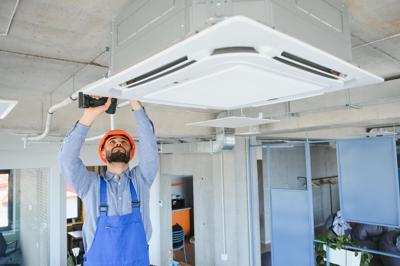
Air Conditioner Install And AC Repair Service.
Is your ducted air conditioning system leaving you sweltering in the heat or shivering in the cold?
Are you frustrated by high energy bills or uneven temperature distribution in your home?
Ducted air conditioning systems are known for their comfort and efficiency, but like any complex system, they can encounter problems.
These issues can range from minor annoyances to major system failures, where ducted air conditioning experts are essential.
Luckily, with some knowledge and troubleshooting skills, many common problems can be resolved, keeping your home comfortable and your energy costs in check.
Understanding Ducted Air Conditioning Systems
Ducted air conditioning systems are centralized systems designed to provide conditioned air throughout multiple rooms in a home or building.
They consist of an indoor unit (often located in the ceiling or under the floor), which distributes air through a series of ducts, and an outdoor unit.
This setup allows for consistent and even temperature control across all rooms, often controlled via a central thermostat.
The Components of a Ducted System
1. Indoor Unit: Houses the evaporator coil and blower motor, working to cool or heat the air.
2. Outdoor Unit: Contains the compressor and condenser coil, releasing hot or cold air outside.
3. Ductwork: A network of insulated tubes that transport the conditioned air to different rooms.
4. Vents and Diffusers: Through which the conditioned air enters your living spaces.
5. Thermostat: Allows you to set and maintain your desired temperature.
Common Problems with Ducted Air Conditioning Systems
Even with regular maintenance, ducted systems can encounter issues.
Understanding these common problems can help with timely identification and resolution.
Uneven Temperature Distribution
Sometimes, certain rooms may feel cooler or warmer than others.
This could be due to poorly designed ductwork, blockages, or inconsistent air pressure.
Solutions:
- Check Vents and Registers: Ensure they are open and unobstructed.
- Inspect Ductwork: Look for blockages or leaks that could be affecting airflow.
- Consider Zoning: Installing a zoning system allows you to control temperatures in individual rooms or areas.
Unusual Noises
Grating, banging, or whistling noises can be disruptive and may signal underlying issues.
Possible Causes:
- Loose Components: Screws or other parts may need tightening.
- Ductwork Issues: Expanding or contracting ducts might produce noises.
- Motor or Fan Problems: Bearings or blades could be faulty.
Solutions:
- Tighten Loose Parts: Secure any loose screws or components.
- Inspect the Motor and Fan: Repair or replace faulty parts as needed.
Poor Airflow
If your system isn't delivering adequate air, the problem could be within the ductwork or the unit itself.
Solutions:
- Check Air Filters: Ensure they are clean and replace them regularly.
- Inspect Ducts for Obstructions: Remove debris or blockages impeding airflow.
- Examine the Blower Motor: It should be functioning properly to move air through the system.
Increased Energy Bills
A sudden spike in energy bills can be a sign that your system isn't operating efficiently.
Solutions:
- Routine Maintenance: Regularly service your system to keep it running smoothly.
- Upgrade Thermostat: Consider a programmable or smart thermostat to better control usage.
- Seal Ductwork: Prevent air leaks that could cause the system to overwork.
Leaking Water
Water leaks can occur due to several reasons and must be addressed promptly to avoid damage.
Solutions:
- Check the Drain Line: Ensure it isn't clogged and is allowing proper drainage.
- Inspect Insulation: Ducts should be adequately insulated to prevent condensation.
- Check the Coils: Evaporator coils that freeze and thaw could be the issue—ensure they are clean and functional.
Preventative Measures and Maintenance
While addressing issues as they arise is crucial, regular maintenance can prevent many common problems.
Scheduled Inspections
- Professional Servicing: Schedule professional inspections at least once a year.
- DIY Checks: Regularly inspect your system for signs of wear and tear.
Regular Cleaning
- Filter Replacement: Clean or replace air filters every few months.
- Duct Cleaning: Consider professional duct cleaning to maintain airflow and prevent blockages.
Energy Efficiency Tips
- Maintain Consistent Temperatures: Avoid drastic changes that could overwork your system.
- Use Blinds or Curtains: Keep heat out or preserve warmth by utilizing window coverings.
- Ceiling Fans: Use fans to distribute air more effectively without over-relying on your HVAC system.
When to Call a Professional
While many problems can be resolved through DIY methods, some require a ducted air conditioning professional.
If you've tried the troubleshooting tips above and are still encountering issues, or if you're dealing with electrical components, it's best to consult a professional.
Signs You Need a Professional
- Persistent Issues: Problems that recur even after repairs may indicate deeper issues.
- Electrical Problems: Flickering lights, circuit trips, or other electrical issues are better handled by professionals.
- Refrigerant Leaks: This requires specialized equipment and expertise to address safely.
Ducted air conditioning systems are a fantastic solution for maintaining comfortable temperatures throughout your home.
However, understanding potential issues and their solutions is crucial for ensuring your system operates efficiently.
From uneven temperatures and unusual noises to increased energy costs, being proactive in troubleshooting and maintaining your system can save you time, stress, and money.


(0) comments
Welcome to the discussion.
Log In
Post a comment as Guest
Keep it Clean. Please avoid obscene, vulgar, lewd, racist or sexually-oriented language.
PLEASE TURN OFF YOUR CAPS LOCK.
Don't Threaten. Threats of harming another person will not be tolerated.
Be Truthful. Don't knowingly lie about anyone or anything.
Be Nice. No racism, sexism or any sort of -ism that is degrading to another person.
Be Proactive. Use the 'Report' link on each comment to let us know of abusive posts.
Share with Us. We'd love to hear eyewitness accounts, the history behind an article.